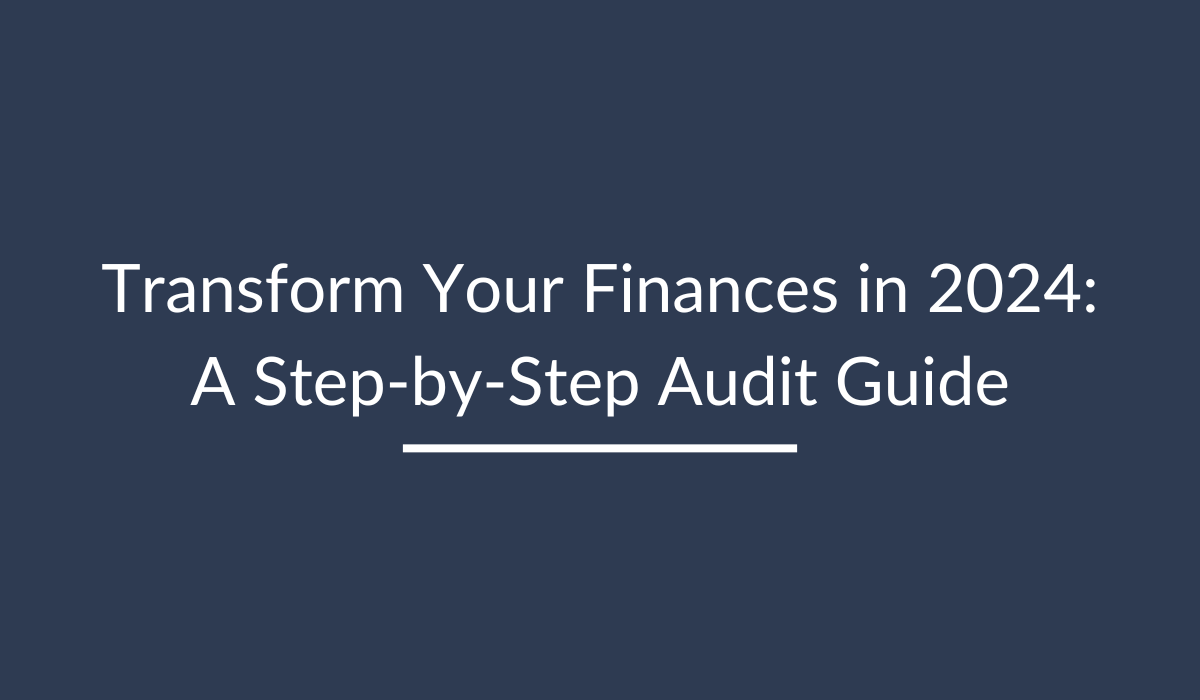
Transform Your Finances in 2024: A Step-by-Step Audit Guide
As we approach 2024, taking charge of our financial health becomes increasingly important. Conducting a personal finance audit is more than just a review of your numbers; it's a critical step in aligning your financial practices with your personal and life goals.
In this article, we will guide you through the steps of a successful financial audit, equipping you with the necessary tools and knowledge to make informed decisions - As well as steps to take after your audit to ensure your continued success.
This is all about empowering you to achieve financial success and stability in the coming year. Follow the steps below to transform your finances in 2024.

1. Reviewing Your Goals and Financial Sentiments
The first step is introspection. Reflect on your financial goals and how you currently feel about your finances. Are you aiming for debt freedom, saving for a house, or planning for retirement?
Understanding your emotional relationship with money is just as important. Are you anxious, confident, or indifferent about your financial future?
Recognising these emotions helps tailor a financial strategy that resonates with your personal aspirations.
2. Assessing Your Financial Resources
Next, it’s time to dive into the core of your finances: income, taxes, debt, savings, and investments. Evaluate your income streams – are they stable or fluctuating?
Assess your debt – consider interest rates and prioritise repayment. Examine your savings and investments – are they yielding the desired results?
This step isn't just about figures; it's about starting to get a clear picture of each financial aspect.
3. Evaluating Your Expenditure
Categorise your spending into monthly bills, non-monthly expenses (like annual subscriptions), and one-off costs.
This is where you decide what stays, gets reduced, or is eliminated. The goal isn't just to cut costs but to align spending with your values and goals.
Our Rapid DIY Money Audit system can offer insights here, but the ultimate decision rests with you.

4. Analysing Spending Patterns for Future Insights
Look beyond current spending to understand where you will be in 12 months if you stay on the same trajectory.
Often, things can look ‘ok’, but when you start looking at how things compound across the next year, you may be less pleased.
So, it’s important to analyse spending patterns as they reveal potential risk areas and predict where you'll be financially in a year. Are there spending habits leading you away from your goals?
This analysis is crucial in pivoting towards financial success. This can be difficult to navigate if you are doing it off the top of your head.
Our Rapid DIY Money Audit can help with you with a fully automated sheet that calculates the next 12 months for you and highlights risk areas.
5. Organising Cash Flow and Implementing Savings Strategies
This section is split into three key actions;
- After analysing your spending, you want to take action on the cost-saving opportunities you identified in step 3. Set deadlines for reducing particular bills and expenditures.
- Once you have done this, it’s time to reorganise your cash flow so that your outgoings closely align with when you receive income. This ensures you have funds allocated for upcoming bills.
- The final step in this segment is to set up purpose-specific accounts – one for savings, investments, holiday fund etc.

6. Creating a 12-Month Financial Plan
With the insights gained, draft a 12-month financial plan. This plan should include monthly savings goals, debt repayment strategies, and investment plans. It's not just about setting goals but creating a roadmap to achieve them.
7. Establishing Healthy Money Habits
Long-term financial health is rooted in daily habits. Establish practices like regular budget reviews, mindful spending, and continuous financial education.
These habits will be the backbone of your financial success in the long run. If you aren’t where you want to be financially, it may be due to habits that are not supporting your success. Now is the time to change this.
8. Setting Up a Monthly Financial Tracking System
Finally, set up a system to track your finances monthly. This could be as simple as a spreadsheet or as detailed as a personal finance app. Regular monitoring keeps you on track and allows for timely adjustments.
If you don’t know where to start with this, the Rapid DIY Money Audit has pre-built sheets that make it super easy to set up monthly tracking and monitor the important factors for your long-term success.
Conducting a personal finance audit is a transformative journey. It requires honesty, commitment, and a willingness to adapt. Take a day to sit down and follow the process outlined in this article. If you want a little helping hand, check out our Rapid DIY Money Audit program that will take you through this process efficiently so you can get it done in a day. Your financial success in 2024 is about making informed, intentional choices that align with your personal goals and values.


Leave a comment
This site is protected by hCaptcha and the hCaptcha Privacy Policy and Terms of Service apply.